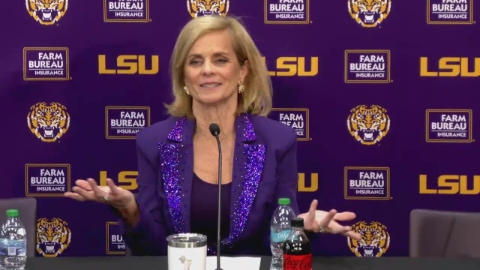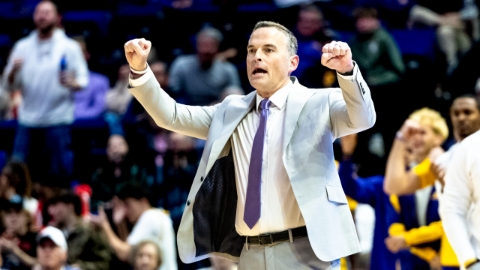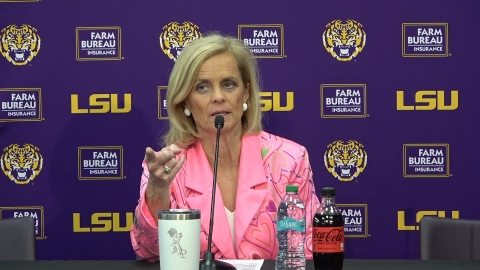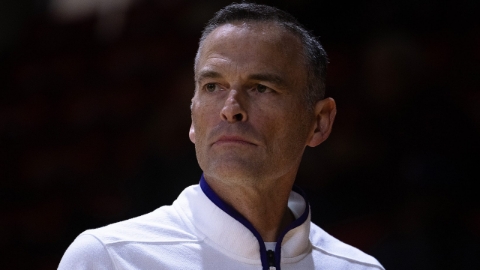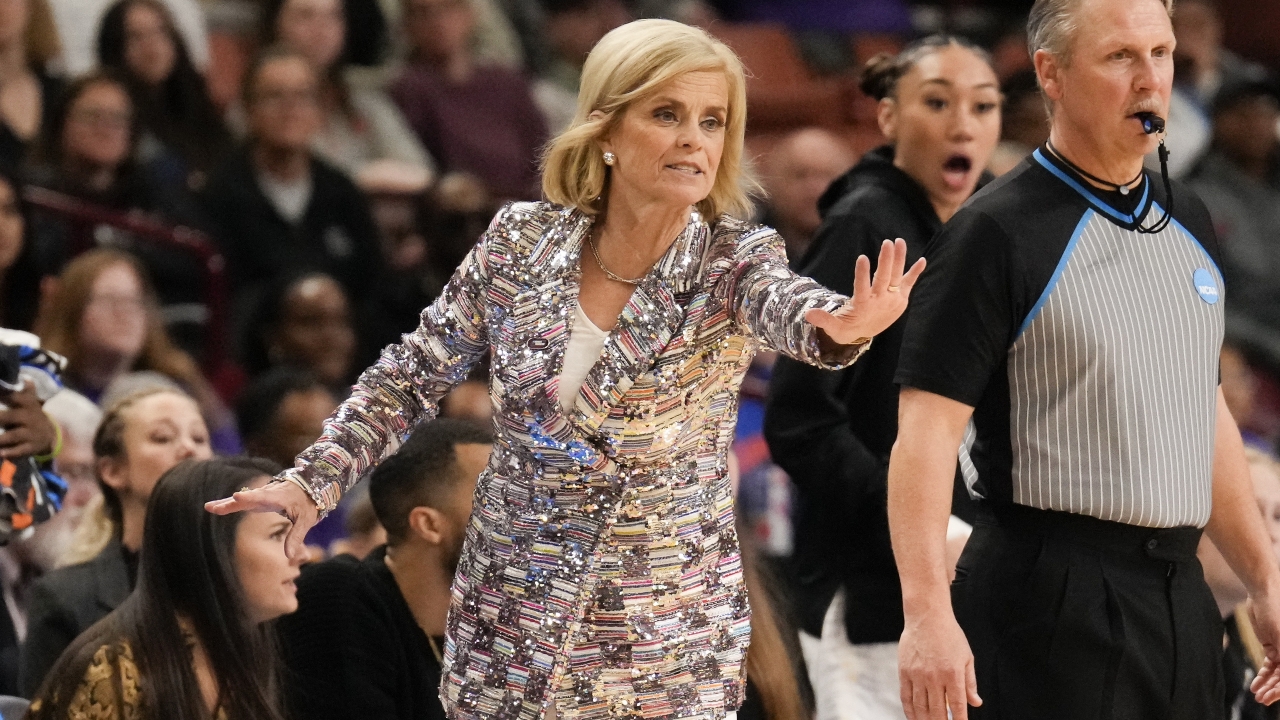
LSU head women's basketball coach Kim Mulkey participated on a video conference call with the media Tuesday morning where she discusses her team's upcoming trip to the Final Four in Dallas and much more.
Q. Your thoughts on Virginia Tech? I'm sure you caught some of the game last night. Your thoughts on what they bring to the table and how you stop that?
KIM MULKEY: Well, I'm familiar with Virginia Tech. I played against a lot of those players when they were younger. If you'll remember when we were in the bubble in San Antonio, so I know all about four of them for sure. They're just older now and just so much more improved.
Certainly you start with Amoore and Kitley. That's the two main players for them, but they're not the only players.
Kitley is a problem with her height and her ability to shoot the face-up jumper. She's not just a back-to-the-basket post player. Amoore, boy, she's got range and she's got just a deadly step-back move out there on the perimeter, and those two, I just remember playing them in the bubble and then watching them today and just how much better they are.
But I think the world of Coach Brooks. I think he's just a classy guy, a great coach, and they're a No. 1 seed for a reason.
Q. I was just curious what your schedule is going to look like.
KIM MULKEY: Well, we're just finishing up this morning, practice and film work. We're required to be in the Dallas area this afternoon and evening for media things tomorrow.
We will practice whatever it is that they give us there. I know we can do an offsite practice tomorrow. We can't get on the main floor that we're playing on until Thursday, and that's only for 50 minutes.
So we've got to find a place on Wednesday to go practice.
I have three kids from Texas. Two are right there in the metroplex. The third one is from the Houston area. So they are really excited.
So yeah, we're going to practice somewhere.
Q. Coach, okay the SEC has a great showing in the Final Four this year. What do you think it is about the conference that has prepared you and how competitive has it been and what does it say about the conference as a women's basketball conference?
KIM MULKEY: Thank you for asking that question. I feel like the SEC in a lot of ways was disrespected all year. I feel like there were two teams that should have been ranked in the top 25. They played a great non-conference schedule, and heaven knows we don't want to talk about those non-conference schedules, do we? But they never could get ranked, but yet they were doing what the committee wanted them to do and play all those tough teams.
But I knew when we played them, and I'll tell you who they were: Tennessee and Ole Miss for sure. When we played them, the first thing that stood out to me was they guard you. They guard you. I just think in this league, there's so many teams, and -- was it 16 games that we play? You're seeing a different style of play twice a week, and you're seeing the defending national champion. Some schools in the league had to play South Carolina twice.
When you play that many games against teams that I feel really emphasize defense, it's going to make you better, and I'm selfish, I get it, because I'm going to be partial to the SEC. But when you have four teams in your Sweet 16, it speaks volumes, particularly when you only had seven from the league get in the Tournament. I thought the three teams that lost out, they could have won their games.
It was nip and tuck in those games that the three lost out in.
Now, moving to the Final Four, I think it's a great thing for the SEC to promote that 50 percent of your teams in the Final Four come from the SEC.
Q. Kim, you said what about everybody was in America watching that game and during the time-out about the missed shots and the poor shooting. A lot has been made about the basketball, some saying it's the rubber, same saying they're overinflated. What are you hearing behind the scenes on that? Everybody of course is using it, but also is that what has kind of maybe derailed Alexis Morris started using that ball, has it affected her maybe more than some other players?
KIM MULKEY: I first heard about the ball when I was watching the men's tournament, and then when the balls were shipped to us in the first and second rounds, I didn't pay much attention to it.
But then when I heard you get new balls I think is what they told me at every round, and I started seeing not just how poorly we were shooting the ball but handling the ball. You know, our ball handlers coming up that floor and been doing it all their life and all of a sudden you see that ball take a big bounce on you, it's not the floor, I don't think. I know the floors are new. I know they ship in new floors at different places, but that was my first deal as a ball handler, it just doesn't look like it's smooth.
Then watching some of the men's games as they got deeper and I thought that is a normal, easy jump shot for these guys that they're just clanking off the rim.
Then of course the Miami game with us, I meant it not as anything but the honest truth. That was just ugly. It was ugly. Nobody could make a shot. One three-pointer out of both teams? It wasn't a great defense that was keeping the shots from going in, it was just missed shots.
My description of the ball after just getting it and holding it is it reminds me -- and I'm sure it's not, I'm sure it's the best that Wilson has, but it's different. The old Wilsons that we've seen have the darker leather and you can just grip them really good and they just kind of flow. These remind me, for lack of a better description, of if you went outside and you needed basketballs to last for a long period of time but yet good balls, not rubber balls, it kind of just reminds me of that.
But Caitlin Clark can hit 41 with those balls. A lot of other people have adjusted to it. I just think that until I can get a grasp of it with my own team and hold it, it's a little bit different. It's different.
Q. How would you describe the effect and the role Emily Ward has on this team, especially as the only player left who was here before your arrival?
KIM MULKEY: Every coach in any sport will always have walk-ons. But you choose those walk-ons. Walk-ons have to understand their role. They have to play a big role that may seem very minute to other people. They have to be great teammates. They have to be very unselfish.
Emily, I inherited her, and yet I didn't know Emily, but I knew her mother very well, and I knew coming from that pedigree of her mom, Mary, a great player in college and high school, I knew what Emily was going to be about, and we consequently gave her a scholarship this year.
In each sport, there will be the great All-Americans and the great players and the Player of the Years that everybody will remember, and then there will always be the fan favorite that everybody will remember. Emily, it does not matter minutes, will go down in the history of my coaching at LSU as one of the all-time fan favorites, and it's because she's that great teammate and that person that really represents your program.
Q. You're entering another category of hallowed territory with Vivian Stringer with getting teams to the Final Four, so congrats on that. When you came to LSU, there was a collective sigh of relief from a lot of former players, Seimone Augustus was very vocal, saying you should have been there in the first place. Now that you've put the team back into elite national prominence, do you feel any pressure or obligation to succeed to honor the legacy of those legends that supported you from day one?
KIM MULKEY: We've already done that. Winning a National Championship will only put an exclamation mark on it, but we've already done that. We did it last year with a team that had previously won nine games. We sold the arena out many times. We sold more season tickets. We have more marketing. We have NIL deals, we have all that. We have exceeded probably what anybody could just realistically say was possible this quickly, and we've got Seimone a statue, Sue Gunter's name is going on the court. We've done a lot of great things for women's basketball in a short period of time.
Q. How does it feel to you to have had the support from the get-go and for them to embrace you like that?
KIM MULKEY: Well, if you're talking about support from the administration, I wouldn't have come if I didn't feel the support. The support starts with conversations about your contract. Support comes with conversations about what you're going to pay assistant coaches and head coach and bonuses and what you're going to allow us to do. Those conversations take place with a coach before you ever take a job.
The easy part for me was I'm now selling tickets to the entire state. Louisiana Tech people, southeastern people, southern people, and it's because I grew up here. Everybody seems to think that they know me, and they probably do or want to be a part of what I did growing up from Dixie Youth Baseball to four state championships. That was the easy part. I didn't have to reintroduce myself.
Consequently, we have people that would never come to LSU women's basketball games or women's basketball games, period.
That doesn't mean I didn't go work. That doesn't mean I didn't pick up the phone. That doesn't mean I didn't ask for help. But it's a lot easier when you feel like you know each other.
Q. There are a lot of eyeballs on your game-day fashion. I'm wondering how you think fashion can support the sport.
KIM MULKEY: Well, I don't think fashion supports the sport. I think people support the sport. Players support the sport.
Fashion is just a professional thing about me. If you do your homework on me, you will see that clothes have always been important to me, from the time I was in grade school, I wanted to look nice. I wanted to dress nice. Through my years at Louisiana Tech, I used to wear dresses a lot, and then as I became a head coach, it was harder for me to squat on the sideline in a dress. So I quit wearing dresses, but I've always, always felt like I need to look nice. I need to be professional.
Now, what has changed from the time since I was at Baylor to now is the stylists. There are LSU women who are graduates, who are famous designers, and they send me jackets and say, "Coach, you have to do this, this is who we are, this is Louisiana. We like the glit, we like all that stuff. Coach, quite honestly, I don't know anything about basketball, but I will come just to see what you wear."
Well, you know what, I want those that come to the games for that reason to keep coming, and I want them to learn the game of basketball. Those that come because of basketball, forget what I wear on the sideline, look at the product on the floor. Don't make what I wear bigger than what's on that floor and what I have done X's and O's-wise as a coach.
But if me wearing their jackets and things like that helps them but it also sells one more ticket or puts one more set of eyeballs on our game, so be it. But those fashions don't shoot, dribble or anything like that or win a game for us. But it's the modern social media world we live in, and -- but I've always dressed nice. It's just a little bit more glitzy because of where I live and the stylists.
Q. You referenced the bubble game in San Antonio against Virginia Tech three years back. Kenny was telling us that when you greeted him, you were both in masks after the game, obviously, and you said to him that he should be smiling underneath that mask despite the outcome. What did your trained eye tell you about his team and Amoore and Kitley where you thought there was such potential there?
KIM MULKEY: Well, just exactly what I opened up with. You saw talent. You saw raw talent that you just knew they were going to get better. I mean, Kenny was at James Madison and nobody ever wanted to play him because he was that good a coach and just really did wonderful things there, and then when he got to Virginia Tech, he was able to recruit a different athlete, a more -- how do I say it, just a more 5-star, blue-star, whatever they want to call them, type of athletes that maybe he couldn't get at James Madison. You knew, wow, when he gets those kind of kids what that program was about to do.
I just respect his basketball knowledge from what I (muted audio).
THE MODERATOR: Coach, we lost the sound.
KIM MULKEY: I'm not sure where I got cut off, but talking about when those young ladies were freshmen and sophomores, you saw the talent. You know if he could keep them together, which he did, that they were just going to be phenomenal.
They're older, and they've been together. He hasn't had a lot of them transfer out. They don't play a lot of players, so they have that continuity together.
Q. I'm with the Dallas Morning News and wanted to see if you could talk about the impact that Sa'Myah Smith has had on your team as a freshman?
KIM MULKEY: Sa'Myah Smith was on the All-Freshmen Team in the SEC. She comes off the bench as the first sub for either Angel Reese or LaDazhia Williams. We don't beat Miami the other day without her production. LaDazhia got in foul trouble, and not only did she go in there, she produced while she was in there.
She was so deserving of being on the All-Freshmen Team, she comes from a high school that they know how to win at DeSoto High School. She had all her teammates that went to colleges. So Sa'Myah knows how to win.
What she hasn't -- right now is the strength and the power, but she's never going to be a big wide body, she is just got unbelievable leaping skills, blocking skills. She's a quiet, unassuming person, but quietly is very competitive.
Q. I wanted to ask you about Kateri and Jasmine. I don't know if changed roles is the right way to describe it, but how much of an asset is it at this time of year that you've got some ladies on your team willing to do something a little bit different to help the team?
KIM MULKEY: Well, I think you said it best. It's all about the team. It's not about individuals at this stage of the season. It's about the team throughout the entire season.
You can't start but five, but that doesn't mean those are your five best players. They all have roles to play, depending on who we play, how we match up, and what you want to be in our program is you want to be in the rotation of eight to nine players.
The move was made not because Jasmine was doing bad, it was just who we're playing, and now Kateri has kind of helped us on the defensive end, but we don't win here -- we don't get to this point if Jas didn't come in and hit those shots in the first round against Hawai'i.
Q. Coach, with you playing in the Final Four, you're about an hour and a half away from your old school. You did a lot of things here in this state that nobody has ever done, and I would imagine no one will ever forget. It hasn't been that long. Do you have any emotions about that anymore, or is that something that in your mind, in your heart is a part of your life and it's behind you now?
KIM MULKEY: You never spend 21 years of your life building a dynasty, and that's what we did at Baylor. I think we can all agree with that. I still have a home there. My grandchildren are there. So my heart will always be there.
But the timing in my life told me it was time to come back to LSU and put women's basketball back where it properly belongs.
I have lifelong friends there. There will be Baylor people sitting in my section that are heartbroken that I left. I get it. Someday when I'm retired, maybe I'll write another book and have more details, but I love Baylor University, the fans there, the Lady Bear fans there. But it was time. Timing is everything in life.
It's the same way when I left Louisiana Tech. I'm not a coach that lives out of a suitcase. I have been fortunate to be able to choose where I go, and I have not moved much in my career. I left Louisiana Tech after 19 years, 15 as a coach and four as a player, and went to Baylor, and it wasn't because Baylor was killing it in women's basketball. It was the school that was on the phone with me at the time in my life that I was ready to make that move.
LSU was on the phone with me at that time when I was ready to make a move. You don't do -- I don't know, maybe you can tell me. Can you name a coach in men's or women's basketball that did what I did, that left a dynasty that was basically theirs? So I had no blueprint. I had nobody to call. It was my gut and timing in life that told me this is the right move to make.
Q. Because of your previous experience taking Baylor to the Final Four, you've got obviously a group of kids who have never been in this position before in terms of the emotions and building them back up after the high of Miami and getting ready for Virginia Tech, the timing between now. You've done that before.
KIM MULKEY: Just got off the floor. Last thing I shared with them in the middle of the floor was, you're getting ready to play a No. 1 seed. We've not done that. You're getting ready to play a young lady who is the finalist for not one but two awards. We don't have anybody on our team that's a finalist for any award.
Are we satisfied? Are we patting ourselves on the back and saying, hey, this is as far as we can go? Or are you still hungry? And the responses that I received are, Coach, we're ready to move on and get to the next game.
When you have kids that are hungry and not satisfied to just be there, you're going to go compete. Whether we win or lose, I know we will compete.

LSU Tigers 2023 Regional Champions Locker Room Shirt
from: Alumni Hall

LSU Tigers 2023 Regional Champions Locker Room Hat
from: Alumni Hall
